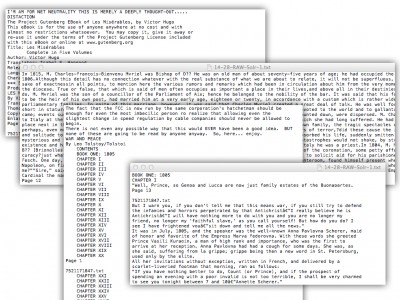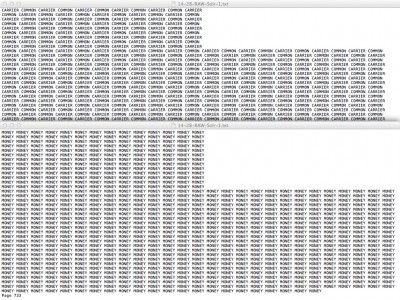
As we’ve noted previously, the FCC opened a comment period, which ended on July 18, 2014.
More than a million comments were received over a five-month period. In fact, comments that were sent by postal mail are still being added.
Please note, however, that a second comment period is now open until September 10. In addition to the FCC ECFS form, comments can also be sent via email to FCC email. It doesn’t get easier than that!
The FCC has also announced a series of staff-led Open Internet roundtable discussions to take place in Washington D.C., which will be free and open to the public and streamed live at FCC live streaming. Here is the official public notice: FCC public notice. See page 2 of the notice for dates and times – they will take place in September and October.
The good news is that ordinary users are not alone on this issue. Companies as large and notable as Microsoft, Amazon, eBay, and Yahoo have all come out in favor of neutrality. President Obama and Google have also put out positions favoring neutrality, albeit with support that has been called into question.
You can download the comments yourself here. Please note that these are very large files in .xml format, ranging in size from 103 MB to 427 MB. According to the FCC, the total amount of data is approximately two and one-half times the amount of plain-text data in the Encyclopedia Britannica!
I am able to open them with TextEdit on the Mac. The formatting makes them difficult to read, but as you scroll down, you will see that comments are the last entry of each grouping, and tend to stand out when they are two or more sentences long. The comments are listed in the date order received, so the 14-28-RAW-Solr-1.xml file has the earliest comments, while the 14-28-RAW-Solr-5.xml file has the latest comments.
When I first opened the file with the earliest comments, I immediately noted that comment after comment was simply this: “Reclassify The Internet As A Common Carrier’†However, working my way through each file I found that in general, people wrote at greater length. Here is an example chosen at random:
Public Comment in Support of Reclassification to Ensure Net Neutrality
By switching to competition based, case by case regulation, the FCC renders net neutrality more vulnerable to a political process that has grown increasingly corrupt following the Citizens United ruling. Recognizing that internet service is even more essential to vital communication, commerce, and democracy than telephone service, it is imperative that we ensure an open internet. The thick clear line that has long existed, but was recently overturned by the courts represents the best way to guard against the inevitable efforts to unfairly leverage access to this exceptionally powerful and vital common, broadband. The FCC should reclassify internet service providers so that they can be regulated the same way as telecommunications companies restoring strict and broad net neutrality rules.
— Joseph Williams in 14-28-RAW-Solr-1.xml
There are, to be sure, a number of disappointing and meaningless entries. One person posted what appears to be the entire text of Les Misérables, while another seems to have added the entirety of War and Peace.

There were also a few extended entries that appeared to be legal briefs and documents. And while it may have satisfied someone’s need to vent, the page upon page of the words ‘COMMON CARRIER’ and ‘MONEY’ probably do not advance the cause whatsoever. According to the FCC, all comments will be reviewed – I do not envy their task wading through all the irrelevant material.

By doing specific searches, I found the following word counts of more relevance to our specific interests (accumulated from all six .xml files):
- “virtual world†– 91 references  (but most are referring to the Internet, not the metaverse)
- “virtual reality†– 37 references
Keep in mind, that is 91 and 37 references out of over a million comments…
What is interesting is that in the total of 91 “virtual world” references, all but five of the comments used the expression “virtual world”  in reference to the Internet, not virtual worlds as we think of them as a metaverse or a technology layered onto the Net.
However, 21 of the 37 comments with “virtual reality” referenced issues like bandwidth for virtual reality applications, such as Second Life or using the Oculus Rift. Clearly the expression “virtual reality” is closer to how people understand “virtual worlds” in the way we mean as related to a metaverse.
The question is, will all these comments make a difference?
The comments submitted to the FCC are not votes. And the companies that want to create “fast and slow” lanes, such as Comcast, still carry great weight by virtue of their impact on the economy overall, and the sophistication of their arguments favoring their position.
I am also personally disappointed there were not more comments directly related to “virtual worlds” or “virtual reality.” Granted these technologies are not in the mainstream, but 128 out of 1,067,779 is a paltry .01 percent.
You still have time to add your voice until September 10. The FCC is seeking insights and perspectives about the first round of comments and they emphasize that they will be reviewing every comment.
Here again are the relevant links:
FCC ECFS form: FCC ECFS form
Email: FCC email
Official FCC Blog: FCC blog
- Virtual curating frees artist - April 16, 2024
- Apple and the bane of VR gentrification - February 3, 2024
- Net neutrality is dead. Why that’s bad for OpenSim grids - December 16, 2017
